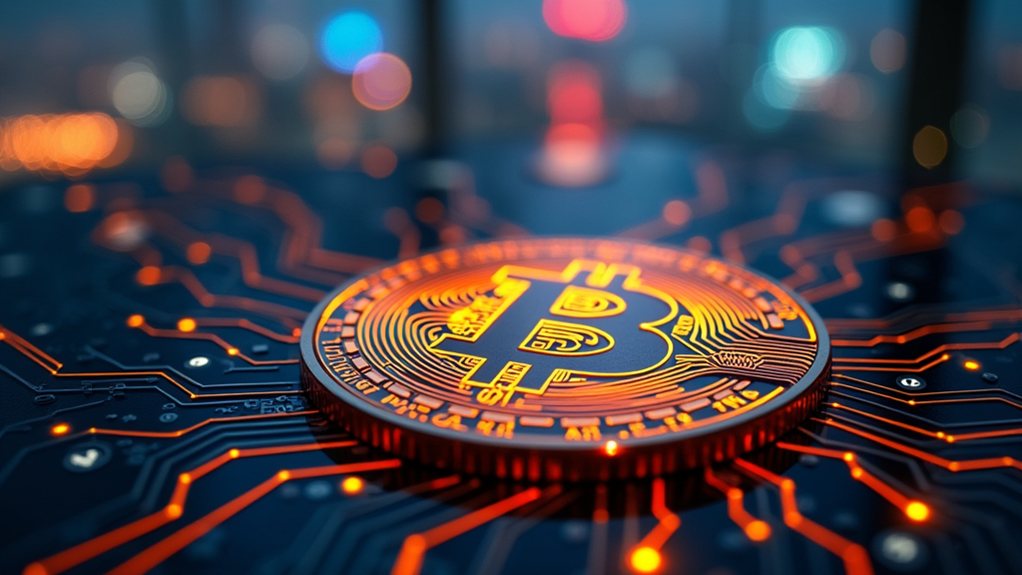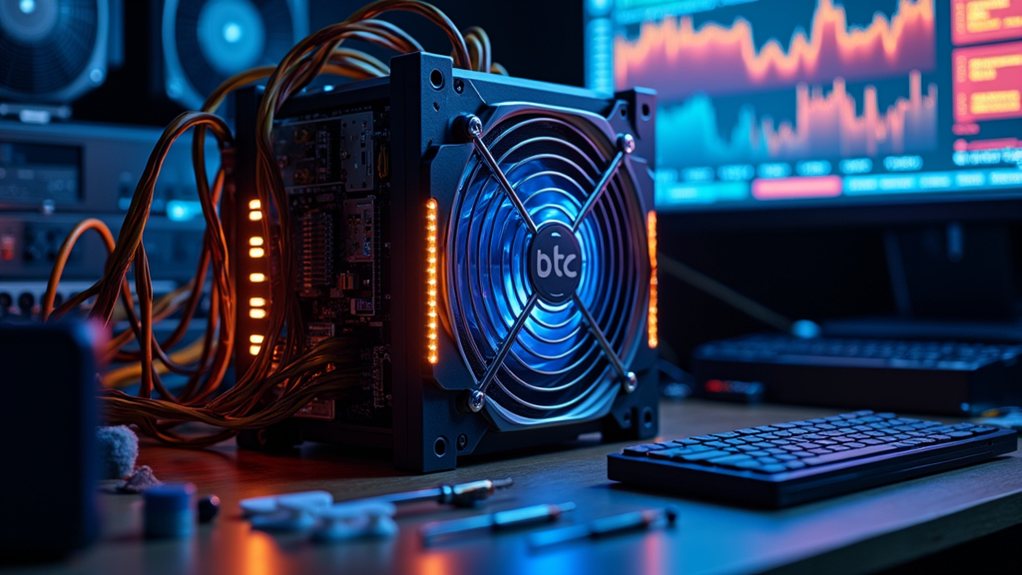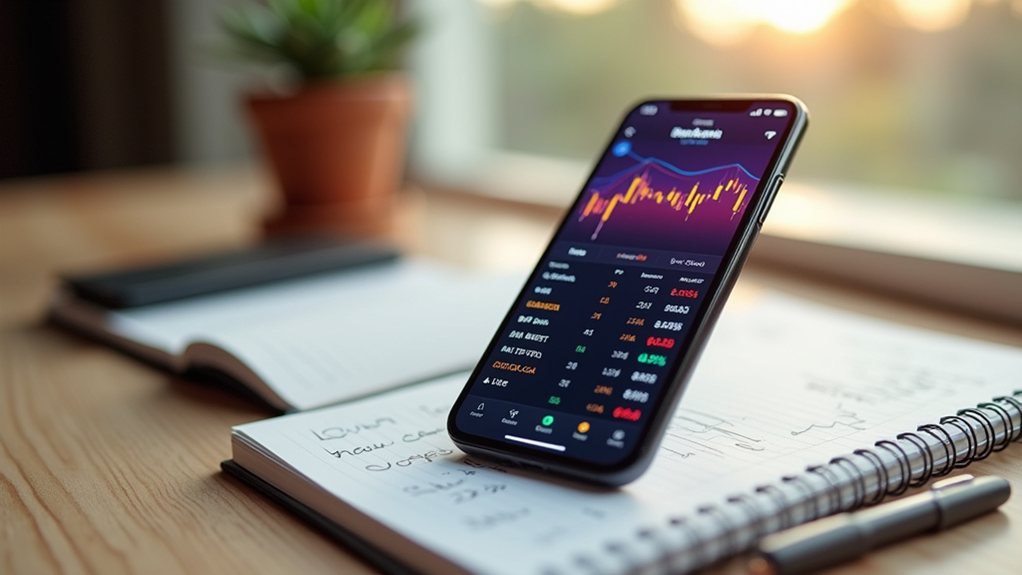Bitcoin isn't backed by gold, silver, or government promises. It's backed by math, code, and energy—plain and simple. The network's security comes from cryptography and miners solving complex puzzles. Its value derives from absolute scarcity (only 21 million will ever exist) and the collective agreement of its global user base. Critics mock its digital nature, but $1.2 trillion in market cap suggests plenty of people get it. The rabbit hole goes much deeper.

Unlike traditional currencies stashed in bank vaults or tied to gold reserves, Bitcoin isn't backed by anything physical—and that's precisely the point. It exists purely in the digital domain, operating on a decentralized network without any central bank or government control. No gold bars. No silver coins. No commodities whatsoever stand behind it. This concept throws many people off. How can something have value without physical backing?
The answer lies in Bitcoin's carefully designed scarcity. Only 21 million bitcoins will ever exist. Period. This hard cap creates digital scarcity that can't be inflated away by overzealous money-printing. Bitcoin's market capitalization exceeded US$1.2 trillion as of April 2024, demonstrating how this limited supply drives substantial valuation. Every four years, the rate at which new bitcoins enter circulation gets cut in half—an event called the "halving." This predictable issuance schedule stands in stark contrast to traditional currencies, which can be printed at will. These halving events have historically preceded significant price appreciation as markets adjust to the reduced supply. Scarcity matters.
Bitcoin's magic formula: 21 million cap, algorithmic halvings, and mathematical certainty—creating digital scarcity in an age of infinite money printing.
What secures Bitcoin isn't some vault in Fort Knox but mathematics and cryptography. Complex algorithms and public-private key pairs enable secure transactions without middlemen. Miners—people with specialized computers—compete to solve mathematical puzzles, validating transactions and adding them to the blockchain. Cryptographic algorithms ensure the integrity of each transaction, making them virtually impossible to forge or tamper with. It's like thousands of accountants constantly checking each other's work, but they're computers, and they never sleep.
The blockchain itself provides unprecedented transparency. Every single Bitcoin transaction ever made is publicly recorded. Anyone can verify who owns what. Try asking your bank for their complete transaction history—they'll laugh you out the door. Bitcoin's ledger is immutable. Once recorded, transactions can't be altered or deleted. This permanence creates trust without requiring a trusted third party.
Yes, Bitcoin consumes electricity—a lot of it. Critics love pointing this out. But that energy consumption is what secures billions in value. Miners convert electricity and computing power into network security. Without this investment, Bitcoin would be vulnerable to attacks. The system is deliberately resource-intensive to make attacking it economically irrational.
The network effect drives Bitcoin's value too. As more people use it, its utility increases. More merchants accept it. More investors hold it. More institutions build products around it. This growing adoption creates a feedback loop of increasing value. The first fax machine was useless. The millionth one was invaluable. Bitcoin works similarly.
Behind the scenes, a global community of developers maintains Bitcoin's code. This open-source approach means anyone can review the code for flaws. Improvements happen through consensus, not corporate mandate. It's messy sometimes, but it works. No CEO can change Bitcoin's rules on a whim.
That's the point. Bitcoin isn't backed by physical assets—it's backed by mathematics, code, energy, and human consensus. That's either revolutionary or ridiculous, depending on who you ask.
Frequently Asked Questions
Is Bitcoin's Energy Consumption Environmentally Sustainable?
Bitcoin's energy consumption is environmentally problematic. Period.
Using as much electricity as entire countries, it's leaving a massive carbon footprint – 22 million metric tons of CO2 annually isn't small change.
Sure, some miners use renewables, but not nearly enough.
The industry talks big about sustainability efforts. Forming committees. Making pledges.
Meanwhile, a single transaction burns through 1,200 kWh. That's ridiculous.
The math simply doesn't work in Bitcoin's favor.
How Does Bitcoin's Volatility Affect Its Use as Currency?
Bitcoin's volatility severely limits its function as everyday currency.
Price swings of 10-20% daily make it nearly impossible for merchants to set stable prices.
Who wants to spend something that might be worth 20% more tomorrow?
Most holders treat it as a speculative investment, not money.
Businesses can't maintain bitcoin reserves with such unpredictable value.
The result? A digital asset that's more casino chip than reliable currency.
Can Governments Effectively Regulate or Ban Bitcoin?
Governments face an uphill battle regulating Bitcoin. Total bans? Mostly ineffective. China tried—activity just moved elsewhere.
Regulated exchanges work better than prohibition. The decentralized nature makes traditional enforcement tricky, and tech-savvy users find workarounds fast.
Cross-border transactions complicate things further. Some regulation helps legitimate adoption, but Bitcoin's design inherently resists central control.
Global coordination would be necessary—good luck with that.
How Do Bitcoin Inheritance and Recovery Solutions Work?
Bitcoin inheritance solutions come in several flavors.
Professional services offer multi-signature wallets and beneficiary designation.
Hardware wallets now include inheritance protocols with time-delayed access.
Legal approaches integrate crypto into traditional estate planning.
DIY methods? People stash seed phrases in safes with detailed instructions.
All aim to solve the same problem: when you die, your bitcoin doesn't die with you.
Not exactly a cheerful topic.
What Happens to Bitcoin's Value When the Mining Reward Ends?
When mining rewards end in 2140, Bitcoin's value will likely face major changes.
Miners will rely solely on transaction fees, which should increase as demand rises. The network's security will depend entirely on these fees.
Scarcity will intensify—no new coins means potentially higher value. But nothing's guaranteed.
Market forces, adoption levels, and technological developments will ultimately determine Bitcoin's fate. The shift might be bumpy.
Economics always is.








